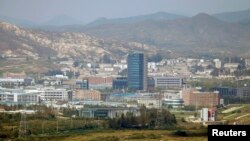A German manufacturer will become the first non-Korean company to begin operations inside the joint North-South industrial complex in Kaesong, North Korea.
A South Korean Unification Ministry official said in an interview with VOA’s Korean Service that Groz-Beckert plans to open a sales office to sell industrial needles to the 20 textile makers operating within the special area. And according to the official, who did not want to be named, the South Korean government has already green-lighted the project.
Cho Bong-hyeon of the IBK Economic Research Institute’s told VOA that opening the German office in Kaesong will further efforts in Seoul to make the zone truly international.
Groz-Beckert will use both company employees and local contractors at its Kaesong sales office.
The industrial complex operates through a special agreement between the two Koreas.
North Korea closed the complex for five months last year, blaming rising tensions from joint U.S.-South Korean military exercises. It also was angry over expanded U.N. sanctions in response to its third nuclear test.
A deal to reopen the zone included an agreement to open the complex to foreign investors, which could make it harder to shut down operations in the future.
This report was produced in collaboration with the VOA Korean service.
A South Korean Unification Ministry official said in an interview with VOA’s Korean Service that Groz-Beckert plans to open a sales office to sell industrial needles to the 20 textile makers operating within the special area. And according to the official, who did not want to be named, the South Korean government has already green-lighted the project.
Cho Bong-hyeon of the IBK Economic Research Institute’s told VOA that opening the German office in Kaesong will further efforts in Seoul to make the zone truly international.
Groz-Beckert will use both company employees and local contractors at its Kaesong sales office.
The industrial complex operates through a special agreement between the two Koreas.
North Korea closed the complex for five months last year, blaming rising tensions from joint U.S.-South Korean military exercises. It also was angry over expanded U.N. sanctions in response to its third nuclear test.
A deal to reopen the zone included an agreement to open the complex to foreign investors, which could make it harder to shut down operations in the future.
This report was produced in collaboration with the VOA Korean service.





